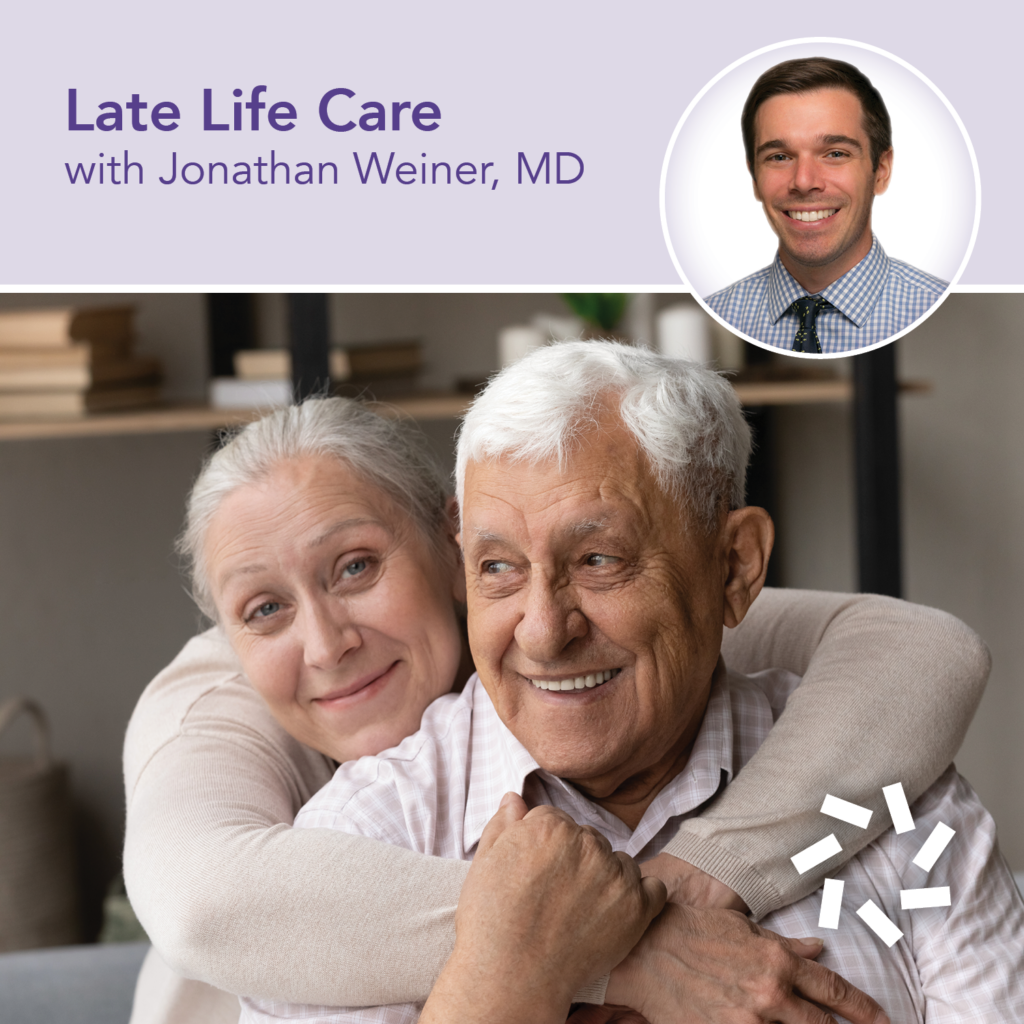
After my father died in 2016, I took a look at my mother’s living will, written in 2000, and wondered whether she still wanted all heroic measures. Once I explained to her what that could mean, she said, “I’m 87 years old. WHY WOULD I WANT THAT??!” (I think it was a rhetorical question.) We revised the document to reflect her current wishes.
I’m grateful my mom was able to advocate for her future self, especially now as we watch her gradually disappear into late-stage dementia. Knowing her goals of care has made it easy for us to make health care decisions on her behalf, including no hospitalization, no treatment for chronic lymphocytic leukemia, and no deep gum cleaning. Haircuts and pedicures are still a go.
Guided by the individual’s values
“When people are younger and generally healthier, the benefits of aggressive medical interventions oftentimes outweigh the risks, but as folks get older and those interventions become less effective, it changes the calculation,” said Jonathan Weiner, MD, Lifespark Medical Director, Value-Based Initiatives. “Treatment might extend life for a short period of time, but the downsides can be really significant.” Those downsides can include serious side effects, pain, being away from family, financial hardship, and more.
To navigate the risks and benefits, Dr. Weiner spends time getting to know the Lifespark member and what matters most to them. “Understanding who that person is—their story, their family life, their values, health care journey, day-to-day life, and the quality of their life today—helps me determine the risk/benefit of some of those aggressive interventions,” he said.
Exploring what’s behind the requests
Occasionally, a family member will ask Dr. Weiner to pursue every possible intervention for their loved one. Before acting on this request, he tries to dig deeper to understand what’s behind it. “Often, it’s an emotional response to the thought of their loved one dying or wanting to be a good advocate for them,” he said.
Instead of negotiating over a specific surgery, medication, hospital, or medical device, Dr. Weiner will shift the conversation to their hopes, their fears, and what they want to achieve. “I might ask, ‘What’s most important to your mother who has dementia? If she were sitting here, tell me what she would want,’” he said, adding that these conversations often build trust in a short period of time.
He’ll listen and reflect back, saying something like, “It sounds like what’s important to your mom is having as many good days as possible, being around family, and not suffering. Does that sound right?’” If the family member agrees, he’ll talk about the ways he can best achieve their mother’s wishes.
Addressing the stigma of hospice
If the individual has a prognosis of six months or less, Dr. Weiner encourages family members to consider hospice for their loved one. Although hospice is simply a Medicare benefit that provides in-home medical care and other services, it still carries a stigma.
“People have misconceptions—that it’s a place you go to die or that it will shorten your life,” he said. To address negative bias, Dr. Weiner often starts by asking what they know about hospice.
That allows him to explain, for example, that while there are hospice centers, most people receive hospice care in their own homes. He also said that people are surprised to learn that hospice can actually extend life. “Once the aggressive treatment is stopped, some people feel so much better that they actually graduate from hospice,” he said.
When fear of losing their parent or spouse becomes overwhelming, Dr. Weiner said he tries to respond with empathy by recognizing the emotion and expressing support. “Sometimes I’ll ask them what’s going through their mind right now,” he said, adding that deep and robust conversations can happen in just a few minutes. “I think there’s something very powerful about knowing we’re with them and that we’ll support them unconditionally through this process.”
Dr. Weiner’s tips to ensure that an individual’s goals of care and end-of-life wishes are carried out:
- Decide whom you want as your health care agent—someone who can speak on your behalf in case you’re unable to—and include them in your Health Care Directive. Get it signed by two non-family witnesses or a Notary Public and give a copy to your medical providers.
- Talk with your family about your wishes, what’s important to you, and how you want to be cared for in the future. Giving them that information now will go a long way to reducing their stress later.
- Have the conversation with your doctor. They may not bring it up for fear of dashing hope, but if you take the lead, they might welcome an opportunity to talk about late-life care options.
To learn more about our approach to Complete Senior Health, visit Lifespark. You can also call us directly at 952-345-8770 or schedule a free consultation. We look forward to talking with you!


